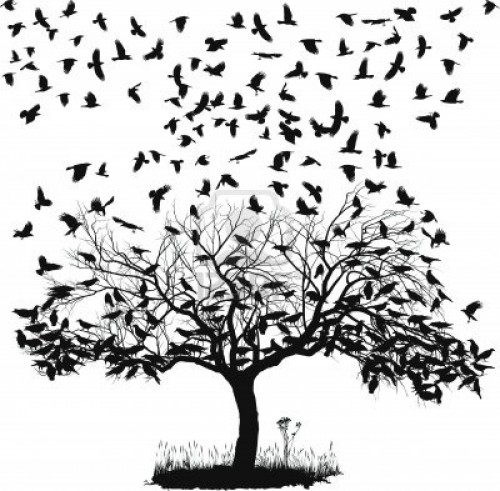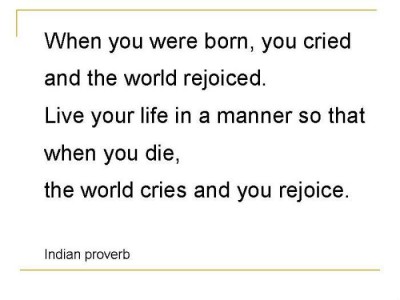Meditation
A Death Meditation
While there are certainly more meditations out there that are harder to do, this one is one of the hardest to do well, even for experienced meditators. The meditation in fact is more or less insight focused, since it can’t be developed very far by means of concentration or be much use for relaxation, but the scope of benefits are vast. Indeed what seems such a grim and depressing meditation has such a beautiful and enlivening aspect that a wise practitioner will examine and put into fruition.
For some it might just “make sense” and make a connection to understanding. There are also a lot of benefits to be gained from it. Here’s a way to do it:
1
The forest or garden is a great place. It is hard to avoid dead leaves and trees, as well as fallen branches. However the strength of mindfulness and experience is needed to avoid melancholy.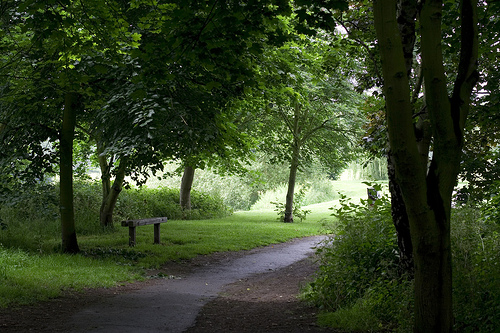
Choose a quiet, peaceful place to meditate and a comfortable posture. This meditation shouldn’t be attempted by those in distress, in an unbalanced frame of mind, or those inclined to fantasy and should have a firm grounding of mindfulness.
Before starting, the practitioner should recognize that the focus of the meditation is totally objective and scientific, not personalized. Where (eg) loving kindness or goodwill is focused specifically towards individuals and people in mind, this one is not.
As with other meditations sincerity is essential, but the practice of virtue is also highly important in this meditation.
2
Firstly consider the many ways this meditation can go astray. Just like many other meditations, this one seldom stays on target and the mind wanders about in a whole scope of ways. The problem is a complicated duality in the mind, part of the mind wants to look into the subject of death, another part wants not only deny it but to stay as far away from the subject as possible. Some examples of many to avoid thinking about are:
The death of yourself in terms of fantasy such as how you’d imagine your funeral, who you would see and what you would like to say to them.
How you will die as it provokes fear and anxiety.
How other people that you love will die, since it will make you sad or anxious.
How others will die that you don’t like because it will make you feel glad for all the wrong reasons.
Where you and others will go after death. This often causes the most problems as the mind starts to become anxious, or is more likely to become prone to fantasy.
Falling into melancholia, or other emotions such as regret, fear, anger, worry etc. Crudely speaking, if the practitioner feels sad or angry (etc), it is a very clear sign they are not doing it right and so will need to start again.
3
Relax the tension and spend another few moments practicing awareness to become perfectly aware of what is going on in the mind. If it is still unsettled it is best to relax and focus on some aspect such as the breath a bit further, or to move to a different meditation practice, such as mindfulness. Once you feel that you are relaxed, stable and aware start to consider one of all of the following suggestions, keeping consistent awareness in check.
Consider the event of death as having the appearance of an assassin. No matter when or where you are, you won’t escape this appointment.
Consider the indifference of the end of life. No matter how successful you are in your ventures, or how much you plan, beg or negotiate there is nothing that can prevent it.
Expand you scope and compare to all peoples. The famous and wealthy, those who do good things, those who are very strong mentally or physically, had perfect health (etc), those with power, technology (etc), were sages, saints, prophets or wise people. None could prevent death. It’s not a matter of ability, or attainments or personal status.
Consider how the body is composite and an ecosystem. Your body is host to bacteria in the gut, viruses, parasites, skin flora etc. Likewise composite in the biological sense of blood, flesh etc. These things can keep you alive (in the normal sense) or make you fatally ill if any part becomes infected.
Observe the conditional nature of life. You need food, water, sleep, air, light, the right temperatures (etc), you need the organs and muscles to be able to breath, pump blood, digest food etc. You need the ability to get food and know safety and danger etc. Can you live without them?
Evaluate it can be natural or unnatural. Death may occur in our sleep, or we may be involved in an accident or other event. It can be at our choosing, or without our choosing.
Consider its unpredictability. We will never really know how long life is, when the time comes, how or where. There’s no way to properly define how and when with 100% certainty.
Think about the shortness of life. A long life is 90 to 100 years, few live beyond that or even make it that far. Days soon become weeks, months, years etc.
Look at the shortness of the moment. We are only here now, the past is gone and the future isn’t here yet. Tomorrow (technically) never comes, there’s only the “now”, which doesn’t stop because people die.
Measure these against you own experiences of people you know that have died. Also expand to understanding that death happens constantly, everywhere on earth something or someone, somewhere is dying right now.
Like other meditations, the analogy of the lotus is still a good one to consider. It grows in the dark and muddy water, but grows towards the light and stands free and beautiful. Like this meditation, the goal is to rise above death by understanding and accepting it, standing free of sorrow, fear and anger by letting go.
Like other meditations, the analogy of the lotus is still a good one to consider. It grows in the dark and muddy water, but grows towards the light and stands free and beautiful. Like this meditation, the goal is to rise above death by understanding and accepting it, standing free of sorrow, fear and anger by letting go.
This section is about recognizing the that everyone experiences a struggle against death at some point or often in their lives either out of fear, despair, anger and other concerns. Nobody wants death when they live happy lives, but it is important to reflect there are many people who do not live happy lives and become either embittered by unhappiness, or experience so much pain they wish to end their lives. Regardless of our own levels of happiness and aspirations, it comes to us all. Regardless of who we are and what wonderful things we may attain, it too will come to us eventually. The fight against it, as well as the feelings about death and what comes afterwards causes so much distress, sorrow and anger in the world and ourselves. The practitioner should question the wisdom of extreme emotions when we may die in a few seconds, days, months, years or decades. The things we cannot predict may be jut around the corner.
4
Start to develop ways of accepting the fact by measuring against your own experiences. Have there been times that death has caused you fear or stress? The important aspect to investigate is that did the wanting to know, wanting to prevent or change already occurred deaths (etc) cause you misery? Ultimately what leads us back every time to the four noble truths is the wanting of things to be, or not to be. The question for the practitioner then to investigate, is does the stress, fear, anger (etc) abate, when that desire is released?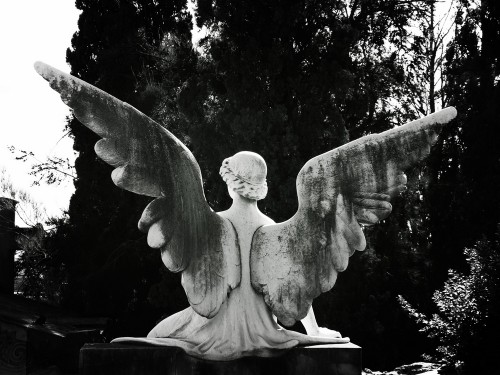
5
The sun sets for us all eventually, but to fall into melancholy is the same as to wildly try and fight it. They are both a form of indulging in death. The practice therefore, is to understand and accept, but let go of it, making life a beautiful thing.
The sun sets for us all eventually, but to fall into melancholy is the same as to wildly try and fight it. They are both a form of indulging in death. The practice therefore, is to understand and accept, but let go of it, making life a beautiful thing.
Start now to practice ways of improving the well being of your life. While the facts of life may cause of sorrow and despair, it still doesn’t need to be so. Some ways of many to improve your happiness and well being are listed as follows, but the practitioner should reflect again that without sincerity, it will be virtually impossible to come to terms and transcend the issues.
- Practice virtue. The innocent really do have nothing to fear.
- Practice investigative understanding. The wise likewise have nothing to fear as they know that we can hasten illness, unhappiness and injury by living carelessly.
- Practice appreciation. When we are unhappy with what we have, by valuing the many things that touch our hearts we balance out the dissatisfaction and we can build appreciation to make it of greater value.
- Practice goodwill or loving kindness. Not just to others but ourselves when we fell angry about how we cannot prevent death, or that there isn’t someone we can turn to to do it for us.
- Practice equanimity. This pulls us back into balance when we run off into fits of emotion. Equanimity is the great balancer.
- Practice compassion. Compassion finally reminds us that all beings are in the same boat, bound to the same wheel of life. Only when we understand how we are bound to it will we ever be free of it.
Complete Article HERE!
Desire
Desire just cheats you. It’s like a sunbeam skipping here and there about a room. It stops and gilds some inconsequential object, and we poor fools try to grasp it – but when we do the sunbeam moves on to something else, and you’ve got the inconsequential part, but the glitter that made you want it is gone.
— F. Scott Fitzgerald, The Beautiful and Damned
This is what you shall do
“This is what you shall do;
Love the earth and sun and the animals,
despise riches, give alms to every one that asks,
stand up for the stupid and crazy,
devote your income and labor to others,
hate tyrants, argue not concerning God,
have patience and indulgence toward the people,
take off your hat to nothing known or unknown or to any man or number of men,
go freely with powerful uneducated persons and with the young and with the mothers of families,
read these leaves in the open air every season of every year of your life, re-examine all you have been told at school or church or in any book, dismiss whatever insults your own soul,
and your very flesh shall be a great poem
and have the richest fluency not only in its words
but in the silent lines of its lips and face and between the lashes of your eyes and in every motion and joint of your body.”
~ WALT WHITMAN Leaves of Grass
Meditation
Visiting the Graveyard –Mary Oliver from her collection entitled, “Red Bird”
When I think of death
it is a bright enough city,
and every year more faces there
are familiarbut not a single one
notices me,
though I long for it,
and when they talk together,which they do
very quietly,
it’s in an unknowable language–
I can catch the tonebut understand not a single word–
and when I open my eyes
there’s the mysterious field, the beautiful trees.
There are the stones.
Blessing the Dust –Jan Richardson (Source: Painted Prayer Book from Blessing the Dust)
… So let us be marked
not for sorrow.
And let us be marked
not for shame.
Let us be marked
not for false humility
or for thinking
we are less
than we arebut for claiming
what God can do
within the dust,
within the dirt,
within the stuff
of which the world
is made,
and the stars that blaze
in our bones,
and the galaxies that spiral
inside the smudge
we bear
Meditation
by Walt Whitman in Leaves of Grass
A child said, What is the grass? fetching it to me with full
hands;
How could I answer the child?. . . .I do not know what it
is any more than he..
And now it seems to me the beautiful uncut hair of graves.
Tenderly will I use you curling grass,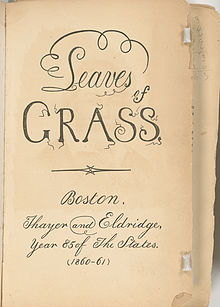
It may be you transpire from the breasts of young men,
It may be if I had known them I would have loved them;
It may be you are from old people and from women, and
from offspring taken soon out of their mother’s laps,
And here you are the mother’s laps.
I wish I could translate the hints about the dead young men
and women,
And the hints about old men and mothers, and the offspring
taken soon out of their laps.
What do you think has become of the young and old men?
What do you think has become of the women and
children?
They are alive and well somewhere;
The smallest sprouts show there is really no death,
And if ever there was it led forward life, and does not wait
at the end to arrest it,
And ceased the moment life appeared.
All goes onward and outward. . . .and nothing collapses,
And to die is different from what any one supposed, and
luckier.













